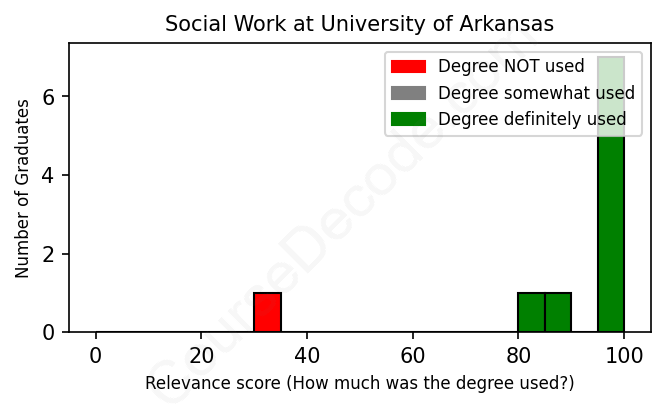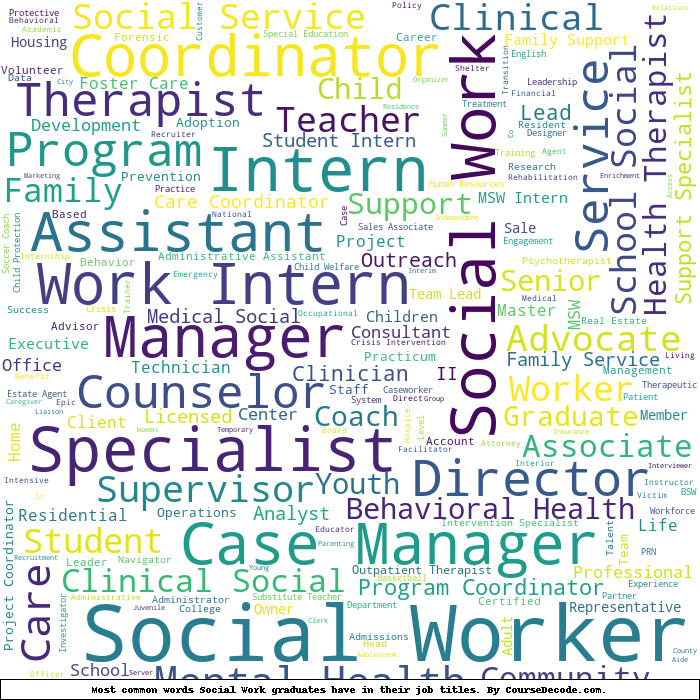
First, some facts. Of the Social Work graduates from University of Arkansas we've analyzed , here's how many have used (or NOT used) their degree in their career:

These are estimates based on AI analysis of 10 LinkedIn profiles (see below).
The verdict? Great! Overall, with an average relevance score of 88%, Social Work graduates from University of Arkansas have a substantially higher likelihood (+21%) of finding work in this field compared to the average graduate across all fields:
And for comparison, here's the chart for all profiles we've looked at across all degrees.
Also, after graduating, 60% of these graduates have pursued further education other than another Bachelor's degree (such as a Masters degree or other), compared to the average across all profiles of 35%. This suggests you may need more than just a Bachelors degree to be competitive as a Social Work graduate.
See the details:
|
Relevance score: 97% We think this person has gone into a career highly relevant to their degree. We think this person has gone into a career highly relevant to their degree.
DEGREE INFOGraduated in 2020 from University of Arkansas with a Bachelor's degree in Social Work. Also pursued further education since (see below). JOB HISTORY SINCE GRADUATIONBSW Intern Benton County Juvenile Probation Jan 2020 - Mar 2020 BSW Intern  Springwoods Behavioral Health Jun 2020 - Jul 2020 Religious Life Intern  Hendrix College Aug 2020 - Oct 2020 MSW Intern  Magdalene Serenity House Aug 2021 - May 2022 Mental Health Professional  Arisa Health Oct 2022 - Present FURTHER DEGREES DONE SINCE GRADUATINGMaster's degreeUniversity of Arkansas 2021 - 2022 ABOUTNo information provided. |
The top 10 most common jobs done by the graduates we've analyzed (ranked most common to least) are:
After looking through the job titles held by individuals who graduated with a degree in Social Work from the University of Arkansas, it’s clear that many of them have landed positions that are closely aligned with their social work training. The most common roles include therapists, mental health professionals, and social work interns, especially at healthcare facilities and counseling services. These jobs typically require a solid application of social work principles—such as client advocacy, mental health support, and crisis intervention—which means graduates are often stepping into roles that are very relevant to what they studied. For example, positions like Acute Care Therapist or Oncology Social Worker revolve around applying the skills learned in their degree programs directly to help those in need.
However, it’s also evident that not all job experiences directly tap into social work expertise. Some graduates took on roles like Customer Service Representatives, Bank Tellers, or Claims Specialists, which while utilizing some soft skills, do not require in-depth social work knowledge. This suggests that while many graduates successfully find positions relevant to social work, a good number may end up in roles that don't fully leverage their academic training. Overall, those who stick to healthcare, mental health, or community services tend to maintain a strong connection to their social work roots, while others drift away from the core principles of their education.
Here is a visual representation of the most common words in job titles for Social Work graduates (this is across all Social Work graduates we've analyzed, not just those who went to University of Arkansas):

When looking at the career trajectories of graduates from the University of Arkansas with degrees in Social Work, it's pretty clear that many of them dive straight into related fields after graduating. A lot of the early jobs involve roles like mental health professionals, therapists, and social workers, which suggest that they’re utilizing their education right off the bat. For example, many from the 2013 and 2016 cohorts found themselves working in behavioral health settings, which aligns well with their studies. It's a promising start for most of them, indicating that the degree serves them well in landing their first job.
However, as we move forward about five to ten years after graduation, the paths start to diverge a bit. While some continue to build their careers in social work or therapy, others seem to pivot into roles less directly related to social work, such as insurance and management positions. For instance, one graduate went from working as a customer service representative to a senior role in admissions at a university, which is more of a stretch from their original training. This trend indicates that while some graduates are staying true to their passion for social work, others are finding alternative career paths, which might not be as aligned with what they studied. Overall, there’s a mix of success stories and those who veer off the original plan, highlighting the varied outcomes after earning a social work degree.
Honestly, a Bachelor’s degree in Social Work (BSW) can be a pretty solid mix of challenge and engagement, and that goes for the University of Arkansas too. You’ll dive into subjects like psychology, sociology, and ethics, which can get pretty intense, especially when you’re doing case studies or group work. The hands-on fieldwork is super valuable, but it can definitely require a lot of time and emotional investment. Overall, I wouldn’t say it’s the easiest degree out there, but if you’re passionate about helping others and ready to put in the work, you might find it really rewarding and manageable!
Most commonly, in the LinkedIn profiles we've looked at, it takes people 4 years to finish a Bachelor degree in Social Work.
Looking at the job history of these Social Work graduates from the University of Arkansas, it seems like their earning potential varies quite a bit. The ones in direct mental health roles, like the therapists and social workers, are probably making decent salaries, especially as they progress to lead positions. However, some of the other grads have been in roles more centered around customer service or administrative tasks, which typically don't pay as well in the long run. Overall, while a few of them appear to be on a path to make solid money, others may find it tougher to hit the higher salary brackets with their current job choices. So, it really depends on the specific career path they choose within the field.
Here is a visual representation of the most common words seen in the "about" section of LinkedIn profiles who have a Bachelor degree in Social Work (this is across all Social Work graduates we've analyzed, not just those who went to University of Arkansas). This may or may not be useful:

Here are all colleges offering a Bachelor degree in Social Work (ordered by the average relevance score of their Social Work graduates, best to worst) where we have analyzed at least 10 of their graduates: